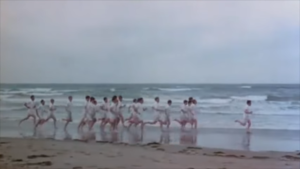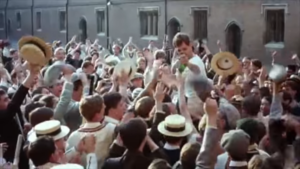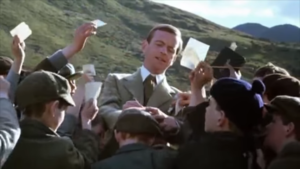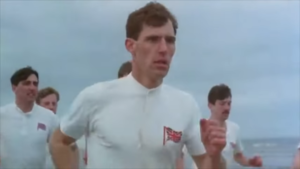Rating: 3.5 out of 5



![]()
I ran track from middle school all the way through college. I was a nationally ranked sprinter during my high school and college years, winning championships and setting records to a pretty okay career. I was more of a 200-meter specialist who also did the 100-meters and HATED the 400-meters with a passion. I remember the hardest thing was practice. Speed-endurance workouts were the toughest. Ever try running on a treadmill at full speed with the incline maxed out?? Not the funniest thing in the world. Looking back on it, training was all around terrible. The best part of it all was the lasting teammates/friends you make. I remember the trash talk when we had to work on the start. I was always the last one out of the blocks. I’m pretty sure that I had the worse start on the planet. Through all the years I ran track, I never watched Chariots of Fire. Never interested me. To be honest, I never had the slightest reason or want to watch the movie. Well, I decided to rent it after one of my former teammates talked about the running scenes but the overall training and the themes.
Chariots of Fire is one of the best sports movies that deals with track and field and historical drama. Any sprinter or die-hard track athlete should watch it along with anyone else. The film also has other underlining themes and points that it makes from one’s faith in their religion along with the social standing of a person. From the sports side of things, it shows the determination and failure many athletes go through. I would say this; this movie is full of British pride and some United States shade.

Directed by Hugh Hudson. The movie revolves around real-life British sprinters Harold Abrahams (Ben Cross) and Eric Liddell (Ian Charleson) after post World War I. Both have God-given talent and are incredible sprinters. Both men come from very different backgrounds, that play a significant influence on the way they perceive running and training. Harold is the son of a Lithuanian Jew, who is somewhat privileged and a student at Cambridge. He races other students around the courtyard as he is very used to being the fastest person. He uses his speed as a chip on his shoulder to overcome the anti-Semitic treatment he gets at the school and from everywhere else. As he races, he quickly gains the respect and admiration of his classmates and administration that try to hold him down and back. Liddell, on the other hand, is the son of Christian missionaries. He is a Scot and a devout member of his church. He doesn’t do anything on Sunday, which is Sabbath in his eyes. If God rested on that day, so must he. Liddell would like to move to China and do missionary work. He views running as a way to spread the word of God. He sees his running speed as a gift from God and runs in his honor. Liddell is a BEAST on the track. Liddell’s view doesn’t sit well with his sister, Jennie, as she sees it as a distraction for his work to God. As the 1924 Paris Olympics are approaching, both men train as their primary goal is a medal. Standing in their way are the Americans Charles Paddock and Jackson Scholz are favored in their events. Liddell’s faith is put to the ultimate test as Abrahams’ drive for recognition could be shaken.

What the story touches most on is the British class structure and one’s faith in God/purpose. Even though both represent their country, they are considerably put in situations that don’t make it easy for them. Abrahams is cocky/privilege as he has never lost a race. He is driven, but when he gets to Cambridge, he sees that there is a wall between him and the administration at the college. Even though the administration never says it to his face, they look down upon him for being Jewish. Abrahams decides to hire a coach, but the school’s administration berates him because it’s not amateurism. Even today that is disputed. Oh, how the world has not changed at all. Why do they explain they have an issue with this?? As they put it, “You are trained by a professional and you have a professional mindset. That makes you look not like a gentleman.” Give me a break! Liddell on the other hand has his faith questions. When Liddell finds out that the 100-meter heats are on Sunday, he states that he cannot run because of Sabbath. He is then placed in a situation where the Prince of Wales questions why he can’t run on Sabbath and that God wouldn’t really mind as it supposed to be country over God. Liddell stands firm until a friend thinks of another way for him to run. He is attacked personally by the paper. Almost crushed by the paper because he chose his faith over his country. Good thing there was no social media back in that time. Liddell is even attacked by his sister, who thinks he has lost faith in God. Getting attacked on all sides. Yet, Liddell never loses sight of what he is and what God has provided him by saying, “I believe God made me for a purpose, but he also made me fast. And when I run I feel His pleasure.”

This movie is excellent in terms of the running scenes but also what the athletes go through. From the look on the runner’s faces to the arms going all over the place to the simple leaning at the tape, it is almost the perfect track sprinter movie. When Harold watches Liddell run for the first time in the 400-meter. Liddell is pushed off the track and lays on the ground for a while. The dude gets up and somehow wins the race. Just seeing Harold sits there in awe as he watched Liddell run is what runner see from the anticipations of watching something unbelievable. Like watching Usain Bolt run the 100-meter and 200-meter at the 2008 Olympics and being left in awe at his incredible and unearthly speed. When Harold hires his coach. The first thing they do together is to look at pictures of the Americans. Just knowing about your competition and how they race is so important. What the movie gets right is the actual training. When Harold’s coach said, don’t overstride or run like the ground is hot or doing high knee drills, those were the terms that were used when I was running. Also, when Harold gets dominated by Liddell. He sits in the stands looking over every single detail in his mind, not even moving from his seat. That feeling of knowing you can win and reviewing what happened in your head over and over again is almost second nature. His facial expression said it all and said, “If I can’t win, I won’t run!”
This film is definitely a British movie and throws some shade at the Americans. Might as well celebrate a significant accomplishment by showing up your brothers across the sea. When Liddell and Abrahams are running and training, the song, “He is an Englishman,” blasts through the movie. It honestly would make any Englishman proud. The shade of the Americans is pretty good. The Americans are loud, cocky, and they show them as this militaristic unit that is yelled at constantly because they are the best. Go USA!

Cross and Charleson should be applauded at the roles they performed. They made the movie seem realistic. Even with them not being accomplished runners, they made you believe they were in their running scenes. Cross was great as Abrahams. Just the passion he brought to his character was believable but strong. Charleson is commendable as Liddell. The complete opposite of Abrahams with a gentle soul and the love of God in his heart.
Finally, the music of the film was spot-on, especially the theme song, which is ironically called “Chariots of Fire.” The song is an instrumental theme written and recorded by Vangelis. The music really sets the tone for the whole film. The song is the first thing we hear as we are introduced to the characters as they run slow motion on the beach with smiles on their faces. It’s one of those songs that you play in your head as a little kid when you’re about to do something awesome in your sport. The song is synonymous with running, just like the overall theme of the Olympic Games.
Chariots of Fire is one of the best films for any young track runner or athletes. The trails and tribulations any athlete go through are put on display. Whether it is the thrill of winning or the agony of defeat. In the words of Eric Liddell, “Everyone runs in her own way, or his own way. And where does the power come from, to see the race to its end?… From within.”